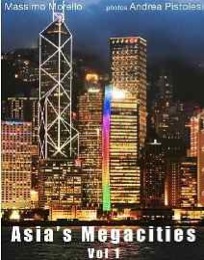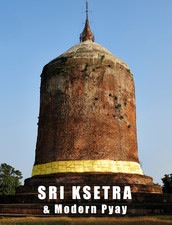Feb 2013
Lost in Translation
22/02/13 02:41 Filed in: Logbook
Many of the things I heard and noted down during a Chinese opera show held in a Bangkok street are probably incorrect. So I’ll write them here.
It’s yet another reference to the film Lost in Translation, in which a long drawn-out speech in Japanese is translated into English in just a few words. In this Bangkok street, the languages spoken were English, Thai, Mandarin and teochew, a dialect spoken in the east of the Chinese province of Guandong. “Very traditional Chinese,” says the young man who is my interpreter. Many linguists consider it to be one of the dialects most similar to archaic Chinese. The dialect has become the language of the so-called Teochew diaspora, approximately ten million people dispersed around Southeast Asia and the rest of the world.
“Destiny,” says the young man to explain the phenomenon that brought his grandfather from the south of China to Bangkok. The young man, however, does not know teochew. He speaks Thai and, very wisely, has also learned English and Mandarin, the official language used in the People’s Republic of China. He was called by Ms Phrasit, the director of the touring company – which performs in Bangkok, Thailand and also abroad, i.e. in Malaysia – who is the subject of a photo reportage in progress by Andrea Pistolesi (who took all these photos). This young man is supposed to be able to help me understand what is going on so that I can write about it.
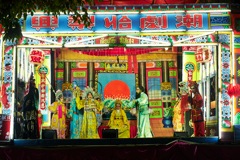
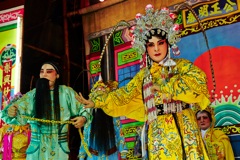
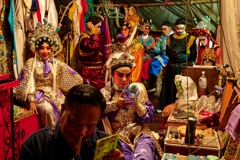
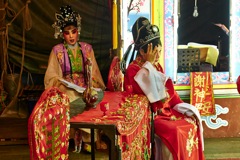
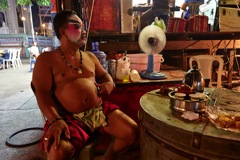
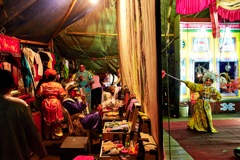
The problem is that before she can speak, Ms Phrasit has to mentally translate from Chinese to Thai. Then she tries to express the idea to the young man, who then translates into English. This is why it is hard to understand the name of the group she leads, for example. It sounds more or less like this: “This Chinese opera group has arrived and good luck to all”. After translating it, the young man looks puzzled and smiles. “It sounds strange, I know,” he says.
The title of the opera they are performing is even harder to understand. Ms Phrasit thinks about it for a long time. And finally gives up: “I don’t know how to say the title. It’s a new story. It’s the story of an honest person.” I should now point out that the lady previously explained that the stories they perform are “stories from the imagination”, in the sense that every year she writes two or three new ones, merging traditional and historical elements with everyday stories. The script is usually written by an author “from China” who is also the director, acting consultant and teacher for the actors who do not speak Chinese. Because, to complicate matters further, some of the actors are “pure Chinese” while others are “pure Thai”. In order to learn their parts, the latter must listen to a recording and then recite by rote.
Paradoxically, then, it can be said that the Chinese opera show finds its traditional setting in Bangkok. They used to say that “a minute on stage requires ten years of rehearsal”. They may not take that long to get ready, but the backstage atmosphere cannot have changed much since this kind of performance began, almost two thousand years ago. The scene backstage is a show within a show, reproducing the script of play-actors in an Italian Commedia dell’Arte, Greek tragicomedy or Indian Sanskrit opera. With the addition of certain elements that create a post-modern image.
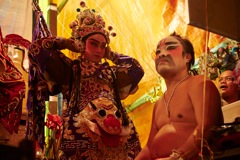
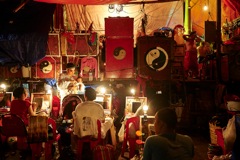
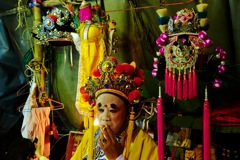
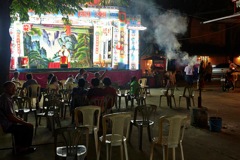
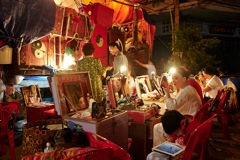
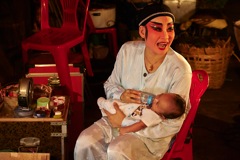
Some are eating soup, some chatting on the cell phone, kids are playing, one actress cradles her baby, a girl with tattooed shoulders eyes up an actor with a striped face. The actors put on their make-up and revise their lines. Some have the script on a tablet. Others are chatting online on social networks.
The company is made up of thirty or so people for whom this is their main job. They earn as a whole about thirty thousand bath per night (about 90 euro), which is split “more or less equally”, as Ms Phrasit puts it. They are commissioned by district committees, associations (the clans present in countries with a strong Chinese community), and individuals wishing to demonstrate their sense of gratitude, goodwill and belonging to the community. And Thailand is one of the countries in Southeast Asia where the Chinese presence is strongest and where Chinese opera is more popular than in China itself.
“There are about twenty companies like ours in Bangkok alone,” says Ms Phrasit, with evident pride in her company and in the Sino-Thai's connection to tradition.
Indeed, while we were walking around the area of Hua Lamphong station trying to find the location of the show (the directions were “near a temple near the station”), we came across another and only after a while realised it wasn't the one we were looking for. Fortunately one of the actors was the brother of our Ms Phrasit. “Everything starts with the family. Then it expands, it splits,” she will tell us later.
After spending some time backstage, I move to the other side of the street, facing the stage, where rows of plastic seats have been set out. There are not many spectators. Mostly women, and mostly elderly. Some are chatting amongst themselves. “Some are talking about the show and some are gossiping,” says the interpreter.
Following the show turns out to be even harder than understanding Ms Phrasit. The actors express themselves with a series of acute metallic sounds accompanied by gongs, erhu (the Chinese two-string “violin”), lutes and other traditional instruments. There are two women on stage, one of which is playing a male character. I ask if this has a special significance. “Thais like to see women dressed as men,” comes the reply.
In the end, I give up trying to understand. There will be time to write about the colours, sounds, movements and mask-like make-up. In Chinese opera, every tiniest detail is a symbol connected to mysterious philosophies and religions. I think by now there are very few specialists capable of decoding everything. Everyone else comes just to look, listen and chat.
Instead, I try to understand how my interpreter, a second-generation Sino-Thai, experiences the relationship with his traditions, whether one identity is dominant over the other. The reply is always the same: “Both.” In the sense that he feels as Chinese as he does Thai. He follows both Chinese and Thai rituals. He finds no contradiction between Chinese (Mahayana) and Thai Buddhism (Theravada). Or in business: certainly, China has become the second global superpower, and many are considering going back in a kind of historical recourse. But he believes he is in the best situation to run things between Thailand and the People’s Republic (without counting the adjacent countries).
We sit a while in silence and watch the show. But he looks bored.
“I don’t understand what they are saying,” he repeats.
I ask him whether he is fascinated by the stage show all the same, whether he feels it as part of his cultural heritage, whether he is interested at all.
“It's a show for old folks.”
“You really don’t like it?” I ask him several times.
“No.”
And suddenly the street scene turns into a scene from Christmas at the Cupiello's, the play by Edoardo De Filippo. Famous for the oft-repeated line “Te piace ‘o presepe?” (Do you like the nativity scene?), which the lead character, Luca Cupiello, constantly asks his son, Nennillo.
“Do you like the nativity scene?”.
“No. But so what, do I have to like it?”
And then again, pointing to the little waterfall in the nativity scene: “Do you like it?”
“No!”
It’s yet another reference to the film Lost in Translation, in which a long drawn-out speech in Japanese is translated into English in just a few words. In this Bangkok street, the languages spoken were English, Thai, Mandarin and teochew, a dialect spoken in the east of the Chinese province of Guandong. “Very traditional Chinese,” says the young man who is my interpreter. Many linguists consider it to be one of the dialects most similar to archaic Chinese. The dialect has become the language of the so-called Teochew diaspora, approximately ten million people dispersed around Southeast Asia and the rest of the world.
“Destiny,” says the young man to explain the phenomenon that brought his grandfather from the south of China to Bangkok. The young man, however, does not know teochew. He speaks Thai and, very wisely, has also learned English and Mandarin, the official language used in the People’s Republic of China. He was called by Ms Phrasit, the director of the touring company – which performs in Bangkok, Thailand and also abroad, i.e. in Malaysia – who is the subject of a photo reportage in progress by Andrea Pistolesi (who took all these photos). This young man is supposed to be able to help me understand what is going on so that I can write about it.






The problem is that before she can speak, Ms Phrasit has to mentally translate from Chinese to Thai. Then she tries to express the idea to the young man, who then translates into English. This is why it is hard to understand the name of the group she leads, for example. It sounds more or less like this: “This Chinese opera group has arrived and good luck to all”. After translating it, the young man looks puzzled and smiles. “It sounds strange, I know,” he says.
The title of the opera they are performing is even harder to understand. Ms Phrasit thinks about it for a long time. And finally gives up: “I don’t know how to say the title. It’s a new story. It’s the story of an honest person.” I should now point out that the lady previously explained that the stories they perform are “stories from the imagination”, in the sense that every year she writes two or three new ones, merging traditional and historical elements with everyday stories. The script is usually written by an author “from China” who is also the director, acting consultant and teacher for the actors who do not speak Chinese. Because, to complicate matters further, some of the actors are “pure Chinese” while others are “pure Thai”. In order to learn their parts, the latter must listen to a recording and then recite by rote.
Paradoxically, then, it can be said that the Chinese opera show finds its traditional setting in Bangkok. They used to say that “a minute on stage requires ten years of rehearsal”. They may not take that long to get ready, but the backstage atmosphere cannot have changed much since this kind of performance began, almost two thousand years ago. The scene backstage is a show within a show, reproducing the script of play-actors in an Italian Commedia dell’Arte, Greek tragicomedy or Indian Sanskrit opera. With the addition of certain elements that create a post-modern image.






Some are eating soup, some chatting on the cell phone, kids are playing, one actress cradles her baby, a girl with tattooed shoulders eyes up an actor with a striped face. The actors put on their make-up and revise their lines. Some have the script on a tablet. Others are chatting online on social networks.
The company is made up of thirty or so people for whom this is their main job. They earn as a whole about thirty thousand bath per night (about 90 euro), which is split “more or less equally”, as Ms Phrasit puts it. They are commissioned by district committees, associations (the clans present in countries with a strong Chinese community), and individuals wishing to demonstrate their sense of gratitude, goodwill and belonging to the community. And Thailand is one of the countries in Southeast Asia where the Chinese presence is strongest and where Chinese opera is more popular than in China itself.
“There are about twenty companies like ours in Bangkok alone,” says Ms Phrasit, with evident pride in her company and in the Sino-Thai's connection to tradition.
Indeed, while we were walking around the area of Hua Lamphong station trying to find the location of the show (the directions were “near a temple near the station”), we came across another and only after a while realised it wasn't the one we were looking for. Fortunately one of the actors was the brother of our Ms Phrasit. “Everything starts with the family. Then it expands, it splits,” she will tell us later.
After spending some time backstage, I move to the other side of the street, facing the stage, where rows of plastic seats have been set out. There are not many spectators. Mostly women, and mostly elderly. Some are chatting amongst themselves. “Some are talking about the show and some are gossiping,” says the interpreter.
Following the show turns out to be even harder than understanding Ms Phrasit. The actors express themselves with a series of acute metallic sounds accompanied by gongs, erhu (the Chinese two-string “violin”), lutes and other traditional instruments. There are two women on stage, one of which is playing a male character. I ask if this has a special significance. “Thais like to see women dressed as men,” comes the reply.
In the end, I give up trying to understand. There will be time to write about the colours, sounds, movements and mask-like make-up. In Chinese opera, every tiniest detail is a symbol connected to mysterious philosophies and religions. I think by now there are very few specialists capable of decoding everything. Everyone else comes just to look, listen and chat.
Instead, I try to understand how my interpreter, a second-generation Sino-Thai, experiences the relationship with his traditions, whether one identity is dominant over the other. The reply is always the same: “Both.” In the sense that he feels as Chinese as he does Thai. He follows both Chinese and Thai rituals. He finds no contradiction between Chinese (Mahayana) and Thai Buddhism (Theravada). Or in business: certainly, China has become the second global superpower, and many are considering going back in a kind of historical recourse. But he believes he is in the best situation to run things between Thailand and the People’s Republic (without counting the adjacent countries).
We sit a while in silence and watch the show. But he looks bored.
“I don’t understand what they are saying,” he repeats.
I ask him whether he is fascinated by the stage show all the same, whether he feels it as part of his cultural heritage, whether he is interested at all.
“It's a show for old folks.”
“You really don’t like it?” I ask him several times.
“No.”
And suddenly the street scene turns into a scene from Christmas at the Cupiello's, the play by Edoardo De Filippo. Famous for the oft-repeated line “Te piace ‘o presepe?” (Do you like the nativity scene?), which the lead character, Luca Cupiello, constantly asks his son, Nennillo.
“Do you like the nativity scene?”.
“No. But so what, do I have to like it?”
And then again, pointing to the little waterfall in the nativity scene: “Do you like it?”
“No!”
0 Comments
The path of the Snake
14/02/13 13:00 Filed in: Logbook
The year of the Snake began on 10th February. According to Chinese astrology, it symbolises hope, intelligence, wisdom and self-discipline. All to the good, then.
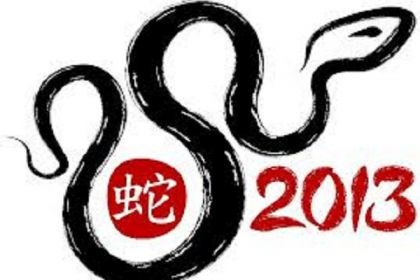
But it is not only the twelve animals of the zodiac that have an influence on the future. The five basic elements – metal, wood, water, fire and earth – also alternate, contributing to determining the future (or the present, depending on when you look at it). This year is dominated by a combination of two elements, fire and water, in conflict with one another. This could have unpleasant consequences, both for private life and for international relations.
The international risks, especially in the theatre of East Asia, are summed up in articles by Francesco Sisci and the Indian former diplomat M K Bhadrakumar, evocatively entitled North Korea nukes the Year of the Snake. Or in this video on the intelligence site Stratfor. Whether true or false, the stories and meanings of the Chinese zodiac are food for thought.
In this case, though, the snake is more likely to set off individual doubts than elegant geopolitical analysis. It is no coincidence that, according to the Judeo-Christian tradition, the snake symbolises doubt in the form of temptation. It is also no coincidence that Carl Gustav Jung used it as an image in his theory of collective unconscious.
It is just that, in the West, Doubt is too often reduced to a right/wrong, good/bad dichotomy, and is therefore exorcised in the form of repentance and good intentions. Which is what New Year’s resolutions are all about.
But here and now we are in the East and here doubt is not defused in the hypothesis of a response or in a choice. Here, it is self-feeding. It is like the coiled snake, the symbol of Kundalini, the dormant energy within every individual, and like the Tao circle, which represents the interdependence between yin and yang, the two poles through which reality manifests itself, because the one does not exist without the other, or rather: each is defined by the other. Here, doubt creates further doubts. Even more so in the year of the snake, the animal that changes its skin and leads you to think of your own future metamorphosis.
“Only the snake understands his path through the grass”. I have no idea where that quote comes from or who said it, but it has always fascinated me.
Personally, I still don’t know what animal I am (not in terms of the Chinese zodiac anyway, according to which I am an ox). Much less do I understand where I am and what path I am following.

But it is not only the twelve animals of the zodiac that have an influence on the future. The five basic elements – metal, wood, water, fire and earth – also alternate, contributing to determining the future (or the present, depending on when you look at it). This year is dominated by a combination of two elements, fire and water, in conflict with one another. This could have unpleasant consequences, both for private life and for international relations.
The international risks, especially in the theatre of East Asia, are summed up in articles by Francesco Sisci and the Indian former diplomat M K Bhadrakumar, evocatively entitled North Korea nukes the Year of the Snake. Or in this video on the intelligence site Stratfor. Whether true or false, the stories and meanings of the Chinese zodiac are food for thought.
In this case, though, the snake is more likely to set off individual doubts than elegant geopolitical analysis. It is no coincidence that, according to the Judeo-Christian tradition, the snake symbolises doubt in the form of temptation. It is also no coincidence that Carl Gustav Jung used it as an image in his theory of collective unconscious.
It is just that, in the West, Doubt is too often reduced to a right/wrong, good/bad dichotomy, and is therefore exorcised in the form of repentance and good intentions. Which is what New Year’s resolutions are all about.
But here and now we are in the East and here doubt is not defused in the hypothesis of a response or in a choice. Here, it is self-feeding. It is like the coiled snake, the symbol of Kundalini, the dormant energy within every individual, and like the Tao circle, which represents the interdependence between yin and yang, the two poles through which reality manifests itself, because the one does not exist without the other, or rather: each is defined by the other. Here, doubt creates further doubts. Even more so in the year of the snake, the animal that changes its skin and leads you to think of your own future metamorphosis.
“Only the snake understands his path through the grass”. I have no idea where that quote comes from or who said it, but it has always fascinated me.
Personally, I still don’t know what animal I am (not in terms of the Chinese zodiac anyway, according to which I am an ox). Much less do I understand where I am and what path I am following.




